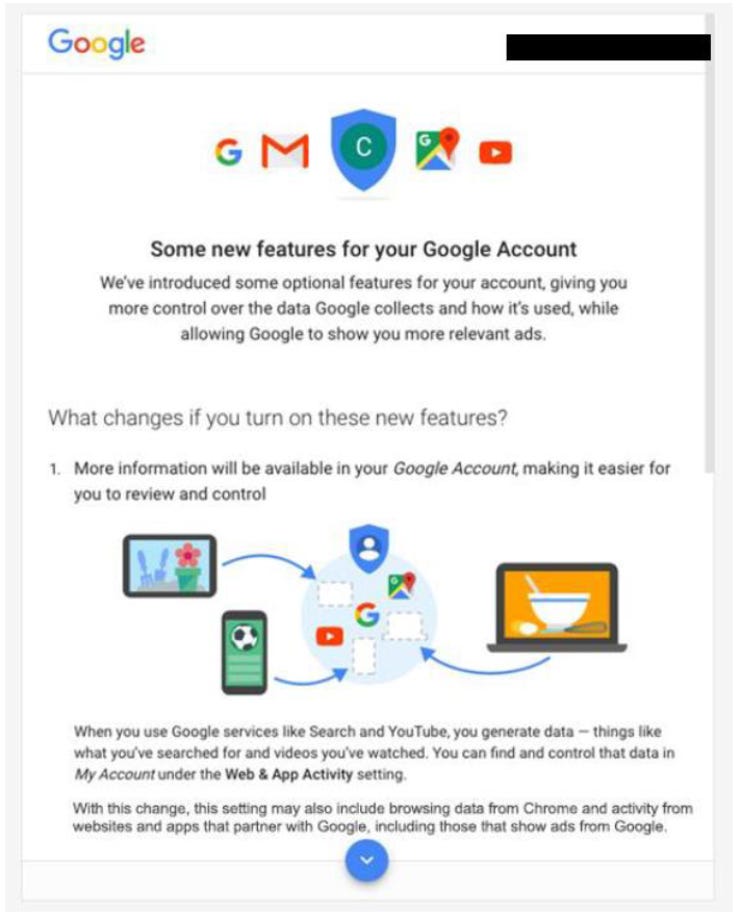Google sued by ACCC for allegedly linking data for ads without consent

The Australian Competition and Consumer Commission (ACCC) has filed a legal action against Google over allegations the company did not gain explicit consent from consumers when it expanded its use of personal data and privacy policy.
Google is being accused of using personal information in consumers' Google accounts in conjunction with information about those individuals' activities on non-Google sites to display ads despite not being given explicit consent.
"This meant this data about users' non-Google online activity became linked to their names and other identifying information held by Google. Previously, this information had been kept separately from users' Google accounts, meaning the data was not linked to an individual user," the ACCC said.
From 28 June 2016 to at least December 2018, Google account holders were prompted to click "I agree" to a pop-up notification from Google that purported to explain how it planned to expand the use of personal data in order to gain consent.
The notification stated, "we've introduced some optional features for your account, giving you more control over the data Google collects and how it's used, while allowing Google to show you more relevant ads".
It also stated, "more information will be available in your Google Account making it easier for you to review and control"; and "Google will use this information to make ads across the web more relevant for you."

According to the consumer watchdog, the "I agree" notification was misleading as consumers could not have properly understood the changes Google was making nor how their data would be used.
"We believe that many consumers, if given an informed choice, may have refused Google permission to combine and use such a wide array of their personal information for Google's own financial benefit," ACCC chair Rod Sims said.
The consumer watchdog is also alleging that Google misled consumers about a related update to its privacy policy. The update included changing the privacy policy to include, "depending on your account settings, your activity on other sites and apps may be associated with your personal information in order to improve Google's services and the ads delivered by Google."
Google's updated privacy policy also stated that: "We will not reduce your rights under this Privacy Policy without your explicit consent".
The ACCC alleges that as Google did not obtain explicit consent from consumers about this change to the privacy policy, Google's statement that it would not reduce consumers' rights without their explicit consent was also misleading.
"We are taking this action because we consider Google misled Australian consumers about what it planned to do with large amounts of their personal information, including internet activity on websites not connected to Google," Sims said.
"The use of this new combined information allowed Google to increase significantly the value of its advertising products, from which it generated much higher profits.
"The ACCC considers that consumers effectively pay for Google's services with their data, so this change introduced by Google increased the 'price' of Google's services, without consumers' knowledge."
At the same time, Google is facing a separate, ongoing lawsuit from the ACCC for allegedly misleading consumers about how location data is collected on Android devices. For that lawsuit, the ACCC is alleging that during 2017 and 2018, Google did not inform Australians that they needed to have the location history setting within Android, as well as the web & app activity setting, disabled to prevent Google storing location data.
"We allege that Google misled consumers by staying silent about the fact that another setting also had to be switched off," Sims said in October last year.
Meanwhile, Google previously said that the ACCC's claims are "out of context" and do not reflect how Android devices handle location data.
The ACCC has also raised preliminary competition concerns about Google's proposed acquisition of Fitbit and is separately working on a mandatory code of conduct to address bargaining power imbalances between digital platforms, such as Google, and media companies.
In August last year, the ACCC said it had as many as five investigations that looked into the conduct of Google and Facebook.
RELATED COVERAGE
- ACCC raises competition concerns about Google's acquisition of Fitbit
- ACCC seeks advice on addressing Facebook and Google 'bargaining power imbalances'
- Australian news generated AU$10m in revenue for Google in 2019
- Google says it doesn't make money from Australian news, kind of
- Google quiet on ACCC browser monopoly concerns
- Google labels ACCC's location data privacy claims as 'out of context'
- ACCC alleges Google mislead consumers over Android location data handling
- ACCC targets Google and Facebook with five investigations underway